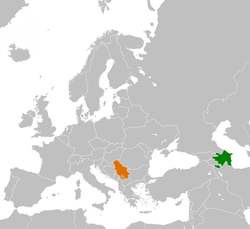Azerbaijan–Serbia relations
 | |
Azerbaijan |
Serbia |
|---|---|
Foreign relations exist between Azerbaijan and Serbia. Serbia has an embassy in Baku. Azerbaijan has an embassy in Belgrade. Both countries are members of United Nations, Council of Europe, Partnership for Peace, Organization of the Black Sea Economic Cooperation (BSEC), and Organization for Security and Co-operation in Europe (OSCE).
History[]
The 223rd Belgrade Red Banner Azerbaijan Rifle Division – formed from Azerbaijani people participated in the liberation of Yugoslavia and Belgrade from Nazi Germany during World War II.
High level visits[]


Serbian Foreign Minister Vuk Jeremić paid a visit to Azerbaijan in 2009 and President of Serbia Boris Tadić paid an official visit to Azerbaijan in 2010. During his visit, Tadić have visited the graves of Black January victims[1] and discussed bilateral and strategic relations between two countries.[2]
President of Azerbaijan Ilham Aliyev paid an official visit to Serbia in 2011. Aliyev and Tadic unveiled a bust to Uzeyir Hajibeyov in the town of Novi Sad as well as attended the opening of Tasmajdan Park in Belgrade.[3]
Two countries are interested in co-operation in energy and education areas. The meetings between foreign ministers Vuc Jeremic and Elmar Mammadyarov are regular.[citation needed]
The books Colors and Color dreams, which consist of poetic cycles of colors by Rasul Rza, People's Poet of Azerbaijan, were published in Belgrade.[4]
Political relations[]
Serbia was among the countries that had voted in favour of Azerbaijan in United Nations General Assembly Resolution 62/243 which was a resolution of the United Nations General Assembly regarding Nagorno-Karabakh.[5] On the day when Republic of Kosovo official declared its independence from Serbia, Khazar Ibrahim had stated that Azerbaijan "views this illegal act as being in contradiction with international law. Proceeding from this, Azerbaijan's position is clear: it does not recognise Kosovo's independence".[6] Azerbaijan has also withdrawn peacekeepers from Kosovo. Turkey has been exerting significant efforts at a senior-level gathering of the Organization of the Islamic Conference (OIC) being held in Dakar, Senegal, to have a strongly worded statement lending support to Kosovo's declaration of independence issued but among some countries Azerbaijan opposed.[7] During the first meeting of Azerbaijan-Serbia intergovernmental commission on 4 November 2011 Co-chairmen of the commission Azerbaijan Minister of Economic Development Shahin Mustafayev showed Azerbaijan's support. Serbia, in return, have stated that they will keep on supporting Azerbaijan's position in the conflict against to Armenia.[8] Azerbaijani Culture Center were also opened in Belgrade. The two countries are also planning to cancel visa regime.
See also[]
References[]
- ^ "Sonxeber.az - Azərbaycandan son xəbərlər". Sonxeber.az. Archived from the original on 19 May 2012. Retrieved 2 May 2016.
- ^ Prezident İlham Əliyev: "Azərbaycan Avropanın enerji təhlükəsizliyi məsələlərində öz rolunu oynayacaq" Archived May 15, 2010, at the Wayback Machine
- ^ "Official web-site of President of Azerbaijan Republic - NEWS » Visits Official visit of Ilham Aliyev to Serbia". Retrieved 2 May 2016.
- ^ "Today.Az - Prominent Azerbaijani poet's book published in Belgrade". Retrieved 2 May 2016.
- ^ Резолюция СБ ООН № 884 от 12 ноября 1993 года (in Russian). United Nations. Retrieved January 4, 2011.
- ^ Azerbaijan says not recognizing Kosovo independence, Reuters, 2008-02-25
- ^ Turkey lobbying for stronger Muslim support for Kosovo, APA, 2008-03-11
- ^ "horizons - Serbia 'supports Azerbaijan's position on conflict'". Retrieved 2 May 2016.
External links[]
- Azerbaijan–Serbia relations
- Bilateral relations of Azerbaijan
- Bilateral relations of Serbia


